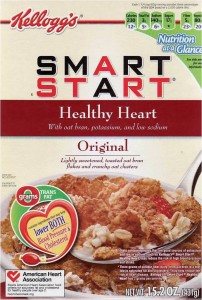This session is on Practicing Food Studies. It will be at 5;00 p.m. Details to come.
American Heart Association: Eat (a lot!) less sugar.
At last, the American Heart Association (AHA) has done something useful. It advises eating less sugar. Americans eat way too much, it says, a whopping 22 teaspoons a day on average. Let’s work this out. A teaspoon is 4 grams. A gram is 4 calories. So the 275 calories in that default 20-ounce soda you picked up from a vending machine come from nearly 17 teaspoons of sugar – close to the average right there. If you have trouble maintaining weight, soft drinks are an obvious candidate for “eat less” advice. Neither the Wall Street Journal (in which I am quoted) nor the New York Times say much about how soft drink manufacturers are reacting to this recommendation, but it isn’t hard to guess.
Here, for example, is what the industry-sponsored American Council on Science and Health (ACSH) has to say:
The study targets added sugars as the main culprit of dietary excess, but since “U.S. labels on packaged foods do not distinguish between naturally occurring or added sugars,” it is difficult to tell the difference. However, “our bodies can’t tell the difference either,” says ACSH’s Jeff Stier. “Natural and added sugars are nutritionally the same. Added sugar causes obesity as much as the orange juice promoted by the American Heart Association causes obesity [e-mail newsletter, August 25, 2009].

This is the first time the AHA has seriously weighed in on sugar. I find this especially interesting because the AHA has a long history of endorsing sugary cereals (as I discuss in Food Politics and also in What to Eat). In this example, the AHA’s endorsement is in the lower left corner. This product has sugars of one kind or another listed 9 times in the ingredient list.
The AHA gets paid for such endorsements. Let’s hope the new recommendation encourages the AHA to stop doing this.
Update August 27: I really don’t know what to say about the ACSH’s Jeff Stier. he is acting more like the Center for Consumer Freedom’s Rick Berman every day. Today’s e-mail newsletter from ACSH contains this statement:
In her blog in The Atlantic, NYU Professor of Nutrition Dr. Marion Nestle has fallen into the habit of suggesting that ACSH is incapable of objective analysis of public health concerns because we are, in her distorted view, “thoroughly industry-sponsored.”
ACSH’s Jeff Stier wrote to her editors: “Like many of the country’s top non-profits, Dr. Nestle’s NYU included, we accept corporate donations, with no strings attached. But we also receive significant support from individuals and foundations. Her misleading description of us suggests that we represent industry. We do not. We are advised by some of the nation’s leading scientists and represent consumers.
“By way of this email, I ask for a conspicuous and fair correction. We are happy to engage on the issues Dr. Nestle writes about, but her attacks on us are below someone of her stature. We’d prefer an informed and enlightening discussion of the issues, not underhanded and unfounded attacks on credibility.”
“Apparently, Dr. Nestle believes that your opinions are irrelevant, since they diverge from her ideological agenda,” says Stier. “We represent you, consumers, who want science rather than ideology informing public health decisionmaking. Does she really think that consumers are so monolithic that they either agree with her or are put up to it by some sinister entity?”
Readers: Does anyone know what is going on with this group? It sounds so much like the Center for Consumer Freedom that I can’t help but wonder.

